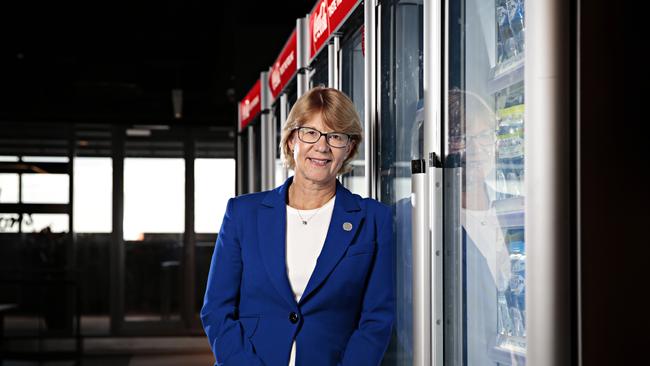Food sector must ‘grab the ball and run’ with federal funds lift
All the ingredients there, but need to think about the whole chain, say leaders.

Two giants of the nation’s food and beverage sector have challenged the industry to “grab the ball and run” by making investments in value-added production to capitalise on the federal government’s vision for a manufacturing-led recovery from the COVID pandemic.
Speaking at The Australian and Visy’s Global Food Forum on Wednesday, new Arnott’s chief executive George Zoghbi and Coca-Cola Amatil managing director Alison Watkins said Australia did not export nearly enough of the premium, value-added foods that it produced.
“We have all the ingredients that goes into the food supply chain today,’’ Mr Zoghbi said.
“We have been doing that for decades, selling ingredients to the rest of the world. What we need to start doing is selling finished goods. That will add a lot of value to the Australian economy and add a lot of value to Australian food manufacturers.
“Companies like ours are shifting more manufacturing to supply export markets out of Australia. Supplying finished goods like soup out of Australia … There is a way, we have to figure it out and invest in it. It is incumbent on us to do that.”
The government chose food and beverages as one of six manufacturing sectors to benefit from $1.5bn in funding in the budget, including accelerated depreciation schedules for big capital investments, from which the government is hoping to stimulate $200bn in business investment in new machinery and equipment.
It hopes this and other tax measures will boost the economy by $12.5bn over the next two years and create an extra 50,000 jobs.
The budget also included initiatives to unlock gas reserves in Queensland and the Northern Territory to fire a gas-led economic recovery, and funding to modernise recycling infrastructure, reduce waste and recycle more within Australia.
Ms Watkins told the forum the government’s $1.5bn manufacturing roadmap had given the food industry a chance “to grab the ball and run with the opportunities the government is presenting”.
“The investment allowance that the government has committed to really stimulate investment in our sector is something we need to drive the scale and productivity, so that’s a real opportunity,’’ Ms Watkins said. She said the COVID-19 challenge had only served to highlight the competitive edge in the region of Australia’s farming practices and the clean, green image of the nation’s food products.
“We can build and leverage technologies which take us to that premium end and make sure that what we are selling has fantastic quality and those sustainability characteristics,’’ she said.
“With COVID, what we can offer as a country is only going to become even more relevant because of our credentials as a safe supplier.”
She said investing across the total food manufacturing supply chain was also essential.
“When thinking of food manufacturing, it’s not just the food item itself, or the ingredients, it’s the whole chain we need to think about and we have a really compelling proposition,” she said.
Earlier on Wednesday, packaging magnate Anthony Pratt also issued a fresh rallying call to the food and beverage manufacturing industry to support the federal government’s COVID-19 recovery roadmap.
But Boundary Bend chief executive Rob McGavin said any rush to bolster local manufacturing had to maintaining consumer trust in the country and its food produce.
“It goes to the heart of the red tape and what we often see as the difficulty of doing business in Australia, but it actually is protecting our reputation. We need to ensure unscrupulous operators are shut down and that it doesn’t just become a race to the bottom on cost,’’ Mr McGavin told the forum.
“We want to ensure consumers have great trust in our food to build on the massive advantage we have had over many, many years. I’m really optimistic about Australian food production … and what the government is doing is really assisting that to happen quicker.’’
Ms Watkins said Victoria’s second lockdown had proved a challenge for the company’s logistics operations, especially with border closures, but that more domestic holidaying — especially in open states such as Western Australia — had provided a boost.
“We’re expecting a strong Christmas,” she said. “People are going to be home and entertaining at home. Our supermarkets are going to see really strong demand for Christmas so making sure we have stock where it needs to be is the critical thing.”
She said the pandemic had been especially beneficial for household brand names.
“Consumers want to resort to what is familiar. The brand Coca-Cola has been doing well and we’ve seen strength in our no sugar varieties,” she said.
Mr Zoghbi, reflecting on how consumer consumption patterns had changed during the pandemic, said snack food volumes were still enjoying high single-digit to low double-digit growth year on year.
“In soup it was a different story, we saw an unbelievable spike in the first few weeks with panic buying and then it declined,” he said.




To join the conversation, please log in. Don't have an account? Register
Join the conversation, you are commenting as Logout